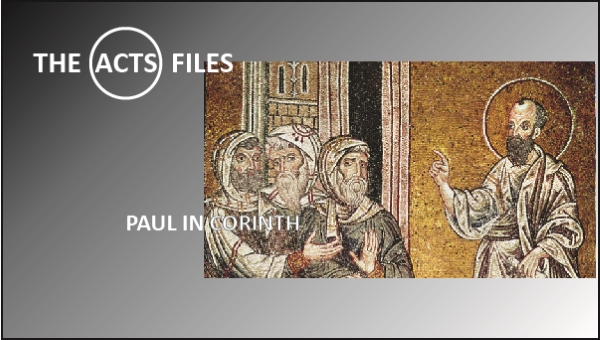By Tyson Thorne

We don’t know how long Paul stayed in Athens after his presentation to the Areopagus council, but we do know that one member of the council came to faith is Jesus. Along with Councilman Dionysius and a prominent woman named Damarius, others also put their faith in Jesus. While Luke doesn’t tell us how many others, the language appears to imply that the “others” who followed were of the political camp or household of the two who were named. This would be more than four (or Luke would have simply named them all) but probably less than 30 (which would include family and household staff). Since Paul considered the grounding of new believers in the faith to be important, it is probable that he remained in the city at least a few weeks longer, possibly anticipating the arrival of Silas and Timothy.
After this undetermined period of time Paul traveled 48 miles west to the city of Corinth (Acts 18.1-11). Corinth was situated at the south end of a narrow isthmus connecting the Greece mainland to Peloponnesus and separated the Gulf or Corinth from the Saronic Gulf. Smaller ships could be wheeled out of the harbor and across the land mass to the other harbor, while larger ships would unload their cargo at one port to be transported across land to the other. The city was the Las Vegas of the ancient Roman Empire. Known for its many temples (and their prostitutes) and taverns, people who lived “la vita loca” lifestyles were often called “Corinthians” even if they had never been to the city. Paul had his work cut out for him.
Once in Corinth Paul met a couple named Aquila and Priscilla who were involved in the same trade Paul had learned earlier in life, tent-making. He divided his time working and evangelizing Jews and God-fearers alike at the synagogue until Silas and Timothy finally caught up to him. Since Paul waited to enter full time mission work until his companions arrival may indicate that it wasn’t safe to do so without the additional support. We’ve seen Paul’s life rescued many times by others who have interceded or warned him before his enemies could kill him.
Not long after turning to full time missions the Jews in the synagogue came to revile him and his success at turning people to the Messiah. Fed up with the constant rejection Paul made a show of leaving the Jewish community by shaking the dust off his clothes. Does this strike a chord with any other passage of Scripture? How about Matthew 10.14 where Jesus tells the disciples to “shake the dust off their feet” when leaving any town that rejected their message? What does this all mean?
Hebrew linguist and scholar John Gill (1697-1771)wrote:
"The Jews believed that even the dust of a heathen and wicked country contaminated them. To "shake the dust off your feet" was the Jewish way of signifying that they would have nothing more to do with those who would not welcome the people of God, or anything more to say to those who refused to listen to their message. By shaking the dust off their feet, the Jews looked upon those who acted in this manner as impure and unholy, as they would any heathen city or country.”
In his righteous anger Paul did far more than shake the dust off his feet, he shook the dust off his entire wardrobe. Paul’s action would have been readily understood by everyone in the synagogue; he was proclaiming that the Jewish people were now outside the fellowship of God. This marked a transition in Paul’s work whereby he would work among the Gentiles exclusively.
Humorously, Paul stormed away from the synagogue and marched next door to the home of Titius Justice. Titius was a follower of Jesus, as was the Synagogue president, Crispus, who may have left the synagogue with Paul. The act became the talk of the community and many came to faith in Jesus as a result. Perhaps fearing his life would be jeopardized by his flamboyant display, God relieved his fears by giving Paul a vision. Despite the debauchery Corinth represented, God informed Paul the he had many people in the city who followed him and who were ripe to receive the message concerning the Messiah. Paul would remain in Corinth for another six months teaching the truth about Jesus from the Scriptures.
|
|
|
